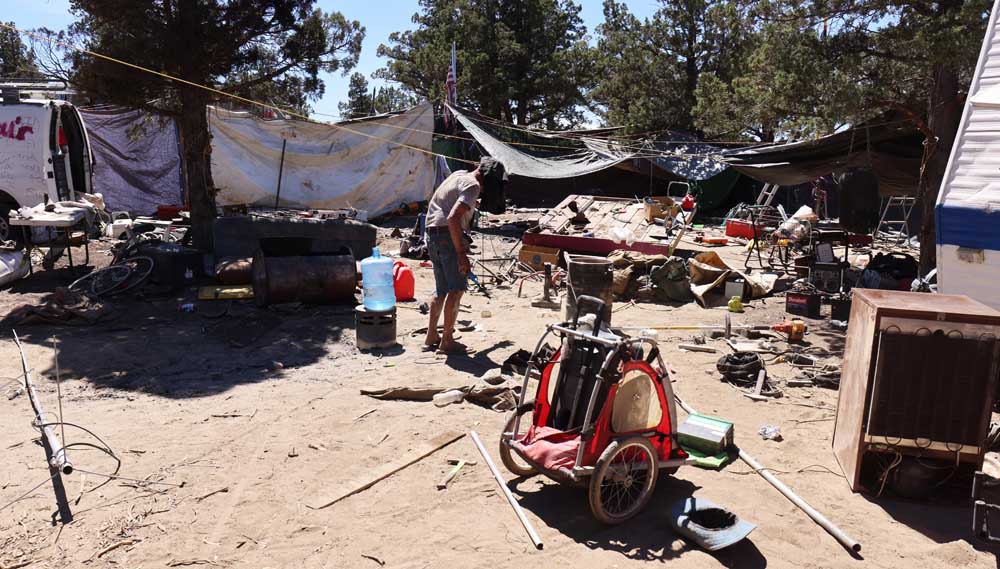Grants Pass case gives Central Oregon lawmakers confidence in camping bans
Published 5:03 pm Friday, June 28, 2024

- Mark Hipple has lived in his camp near Juniper Ridge for seven months after being evicted from his home in Bend.
The U.S. Supreme Court on Friday issued a decision with significant implications for how local governments will address homelessness, ruling in favor of Grants Pass that laws criminalizing camping in public spaces don’t violate the constitutional rights of people without shelter.
The high court’s decision flipped a ruling from a lower federal court that put enforcement of anti-camping laws in murky legal territory. The Supreme Court argued those laws don’t fall under the protections of the Eighth Amendment, which forbids cruel and unusual punishment.
Central Oregonians await Supreme Court verdict in Grants Pass homeless case
The extent to which local lawmakers in Central Oregon will reexamine camping codes is still to be seen. But they can do so with the assured ability to dictate where and how homeless people are allowed to camp, said Dave Doyle, chief legal counsel for Deschutes County.
“I think there was some doubt on that prior to the decision today,” Doyle said in an interview. “But I think that’s now relatively clear.”
The decision sending ripples through cities across the country stems from a legal complaint filed by homeless plaintiffs against the city of Grants Pass in the case Grants Pass v. Johnson. They argued that without a home or shelter to live in, city ordinances stipulating fines for sleeping outside in public places and banning the use of camping gear constituted “cruel and unusual” punishment, because the laws criminalized their status as homeless.
In 2022, a panel of the 9th U.S. Circuit Court of Appeals sided with the homeless plaintiffs, upholding a lower court’s decision. That ruling, along with a similar decision in 2018, Martin V. Boise, put laws with penalties for behaviors associated with homelessness on shaky legal ground.
But the Supreme Court’s Friday decision, delivered by Justice Neil Gorsuch, said the Eighth Amendment focuses on the kind of punishment that a government can impose, not on the kind of things governments can criminalize in the first place, said Jack Landau, a law professor and retired Oregon Supreme Court Justice.
The ruling doesn’t consider other constitutional rights associated with camping in public beyond cruel and unusual punishment, Landau said.
The Deschutes County code that bans camping was adopted last year and crafted to avoid the same legal attacks that plagued Grants Pass, Doyle said. The county also had to work within the confines of Senate Bill 3115, which ensures local laws are “objectively reasonable” as to the burden placed on homeless people. Friday’s decision doesn’t relieve the county from that requirement, Doyle said.
But the Supreme Court’s decision was a confidence boost for Deschutes County that its ban on camping is valid, he said. And while it gives elected officials the ability to make decisions that were legally dicey before, those won’t happen overnight, he said.
Eric Garrity, a homeless advocate and volunteer in Bend, said he’s not concerned about a radical change in policy as a result of the Grants Pass decision. His focus will remain on ensuring homeless people have an alternative place to go when forced from camps.
But the ruling wasn’t what he hoped for, and has caused anxiety among some people camping at Juniper Ridge, on the outskirts of northeast Bend.
“It’s upsetting,” he said in an interview Friday. “The Supreme Court has basically said that for people who are poor or housing insecure, it’s legal, or at least constitutional, for cities to prohibit using a blanket, pillow or cardboard box to try to stay warm and get some sort of rest when they have nowhere else to go.”
The city of Bend conducted a major homeless camp sweep at Hunnell, Clausen and Loco roads on Bend’s northern edge last summer. Some residents of the camps took the city to court, unsuccessfully, in an attempt to stop the sweep, alleging “irreparable injury.”
Some people moved to Juniper Ridge, where people are camping on both city and county land.
Bend adopted its own camping code in 2022, limiting where and how people could camp on city right-of-ways. Despite major sweeps, the code wasn’t used to cite campers in the first eight months after it was adopted.
Mayor Pro Tem Megan Perkins called it a “humane camping code,” and said she doesn’t view citations as an effective way to get people out of homelessness.
“I can’t speak for council, but I will say that my focus is going to continue to be on getting people out of homelessness and into shelter, or better yet housing, rather than sending a police force around to ticket people for trying to sleep,” Perkins said.
Federal officials take notice of homelessness near China Hat Road
Chuck Hemingway, a longtime homeless advocate in Bend, said he hoped the Grants Pass decision would have no impact on the city’s camping code, which he called “pretty reasonable up to this point.”
“I would hope that this would invite some discussion before the Bend City Council and their city attorney, and perhaps within the county as well, to decide what, if anything, is going to change,” he said.








